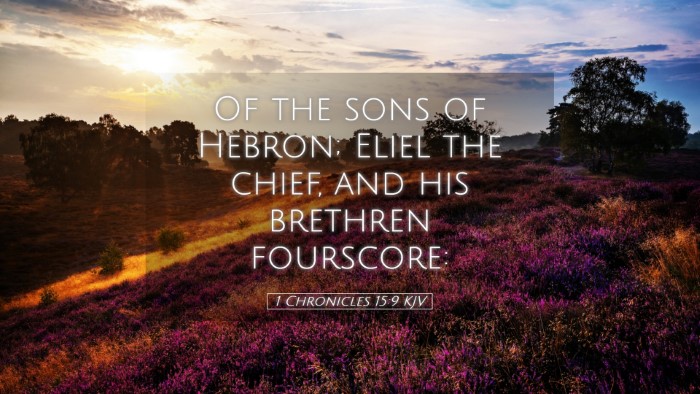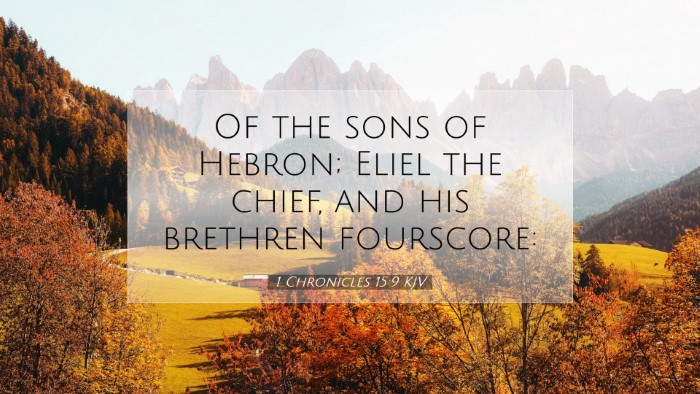1 Chronicles 15:9 - Commentary and Insights
Verse: "And of the sons of Benjamin; Eliezer, the son of Abišua, and the sons of Merari; their names were, Mahli and Mushi. And the sons of Kohath; their names were, Abijah, and Ahitub, and Ahijah."
Introduction
The verse in 1 Chronicles 15:9 is significant in outlining the leaders and members of the Levitical tribes who played critical roles in the restoration of worship and the transport of the Ark of the Covenant. This passage reflects a period of transition and renewal as King David sought to reestablish proper worship in Israel. The genealogical details presented here are not merely historical; they serve a deeper theological purpose, emphasizing the continuity of God's covenant with His people.
Contextual Background
Before diving into the commentary, it is vital to consider the broader narrative. This chapter takes place after King David has ascended to the throne and has made significant political and military advancements. His desire to bring the Ark of the Covenant to Jerusalem reveals a spiritual dimension to his kingship, highlighting the importance of divine presence in national identity and governance.
The Significance of Genealogies
Genealogies in the Bible serve many purposes—validating claims to leadership, establishing continuity of priestly offices, and underscoring God's faithfulness to His promises.
- Covenantal Faithfulness: The detailed accounts of the descendants underline God's ongoing commitment to Israel and the Levitical priesthood.
- Liturgical Order: The organization of the priests' families suggests an established liturgical order that enhances the understanding of worship practices.
Exegesis of Key Terms
Several key terms in this verse deserve attention. The names mentioned carry significance in their derivation:
- Sons of Benjamin: Eliezer and his lineage emphasize the continuity from the tribal patriarch, Benjamin. The Benjamites were pivotal in supporting David's kingship.
- Mahli and Mushi: These names evoke a connection to Merari, the Levite ancestor symbolizing strength and service, reinforcing the themes of dedication and reliance on God.
- Kohath: The sons of Kohath held responsibilities for transporting the sanctuary items, signifying their crucial role in worship practices.
Theological Implications
This verse encapsulates several theological themes significant for both contemporary application and scholarly discourse:
- Restoration of Worship: King David's actions symbolize a restoration not only of the Ark’s physical location but also of the people's spiritual harmony with God.
- Inclusivity in Service: The listing of various tribes and families signifies that service in God’s kingdom, especially in leading worship, is a collective responsibility that spans beyond the priestly lineage.
- The Role of Leadership: David’s initiative in organizing the priests underlines the critical role of godly leadership in reviving and sustaining the faith community.
Commentary from Historical Sources
Insights gleaned from respected public domain commentaries further enrich our understanding of this verse:
- Matthew Henry: Henry emphasizes the importance of preparation in worship, noting that David’s meticulous attention to the priests' roles illustrates the holiness required for approaching God.
- Albert Barnes: Barnes points out the contrast between earlier chaotic worship practices and the renewed order established by David. He highlights the significance of Kohathites' roles and their historical duties in the tabernacle.
- Adam Clarke: Clarke provides a theological reflection on the roles of the Levitical families, underscoring their spiritual heritage and the importance of legacy in spiritual service.
Practical Applications for Today's Church
For modern pastors, students, theologians, and Bible scholars, the insights from this verse and its commentary can lead to several practical applications:
- Valuing Heritage: The heritage of faith and service from previous generations is paramount in guiding contemporary worship environments.
- Fostering Leadership: Just as David organized the Levites, today’s church leaders must cultivate a collaborative environment that honors diverse gifts within the congregation.
- Commitment to Worship: Genuine worship involves preparation, unity, and a recognized structure that honors God’s holiness and presence among His people.
Conclusion
1 Chronicles 15:9 serves as more than a historical record; it stands as a testament to God's ongoing work through generations and the importance of proper worship practices in a community dedicated to Him. By understanding the significance of the genealogies, the context, and the theological implications, one can gain a deeper appreciation for Scripture’s multifaceted nature and its call for us to honor God in both corporate and individual worship.


